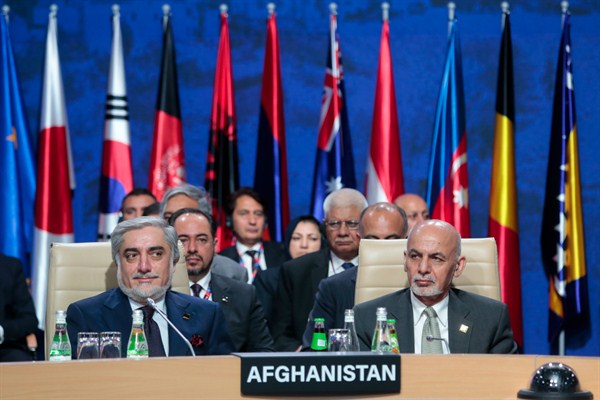With the two-year anniversary of Afghanistan’s national unity government approaching in September, long-simmering tensions between President Ashraf Ghani and the country’s chief executive, Abdullah Abdullah, have broken out into the open. In mid-August remarks to his supporters, Abdullah made his most public and direct complaints to date, calling Ghani unfit for the presidency. He said that his counsel was being ignored by Ghani, his position within the government was being marginalized, and his demands for reforms were going unmet. Although the two leaders have since met one-on-one and attended Afghanistan’s Independence Day celebrations together on Aug. 17, the complicated power-sharing balance within the government, and with its critics on the outside, shows little sign of being resolved anytime soon.
The U.S.-brokered agreement that formed the national unity government and ended a dispute over the outcome of Afghanistan’s 2014 presidential elections set up an ambitious program of reform, little of which has been accomplished so far. In his first official act upon taking office, Ghani appointed his former electoral rival Abdullah as chief executive, a new position. Abdullah often accompanies Ghani on state visits, but otherwise he appears to have made limited progress at integrating himself into government decision-making chains. Over the past two years, the two leaders have fought—up until now largely behind the scenes—over almost all major Cabinet appointments and control of the process of reforming Afghanistan’s electoral law and administration.
A series of committees have been established and re-established to propose reforms to the electoral system. But those proposals have been blocked by the incumbent parliament—whose term expired in June 2015 and which has shown little incentive to set up elections for a new parliament soon—and by election administrators who dispute Abdullah’s allegations of systemic fraud in the 2014 vote. Abdullah and his supporters also lay blame on the presidency for responding slowly to the deadlock over reforms. Although elections are officially scheduled to take place this October, there are few plans or financing in place to hold them this year; the basic boundaries for district council elections and the process for registering voters with a national ID card also remain disputed. Elections are a precursor to holding a constitutional Loya Jirga, or Grand Assembly, which the national unity agreement committed to in order to amend the constitution and formalize the chief executive as an “executive prime minister.”

